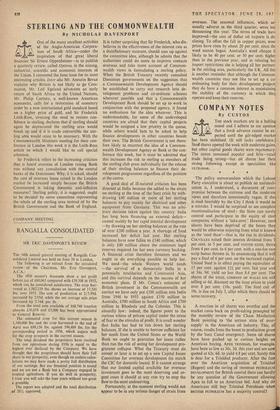STERLING AND THE COMMONWEALTH
BY NICHOLAS DAVENPORT ONE of the many excellent activities .,, of the Anglo-American Corpora-
tion of South Africa—under the
inspiration of that great liberal financier Sir Ernest Oppenheimer—is to publish a quarterly review, called Optima, in the mining, industrial, scientific and economic interests of the Union. I commend the June issue for its most interesting articles. Inter alia Mr. Aneurin Bevan explains why Britain is not likely to go Com- munist, Mr. Leif Egeland advocates an early return of South Africa to the United Nations, Mr. Philip Cortney, a well-known American economist, calls for a restoration of monetary order by a new international gold standard based on a higher price of gold, and Sir Frederick Leith-Ross, stressing the need to restore con- fidence in sterling, declares that if sterling should again be depreciated the sterling area would break up and if it is made convertible the ster- ling area would cease to be necessary. With the Commonwealth Ministers meeting' for their con- ference in London this week it is the Leith-Ross article to which I would like to call special attention.
Sir Frederick refers to the increasing criticism that is heard overseas of London raising Bank rate without any consultation with the central banks of the Dominions. Why, it is asked, should the cost of overseas loans raised in the London market be increased simply because the British Government is taking domestic anti-inflation measures? Sterling polity, it is suggested, ought to be decided by some committee representing the whole of the sterling area instead of by the British Government and the Bank of England. It is rather surprising that Sir Frederick, who dis- believes in the effectiveness of the interest rate as a disinflationary measure, should sum up against the committee idea, although he admits that the authorities could do more to improve contacts overseas and take more account of Common- wealth views in formulating a sterling policy. When the British Treasury recently consulted Dominion governments on the suggestion that a Commonwealth Development Agency should be established to carry out research into de- velopment problems and co-ordinate schemes wherever possible and that a Commonwealth Development Bank should be set up to work in conjunction with the proposed agency, it found no enthusiasm for the idea whatever. This is understandable, for some of the undeveloped countries are afraid that their capital projects would be assigned a low priority in the queue, while others would hate to be asked to help finance developments in other countries beside their own. The British Government is not there- fore likely to resurrect the idea of a Common- wealth Development Agency or Bank at the con- ference this week, but it must be admitted that this increases the risk to sterling as members of the sterling club press individually for the release of their sterling balances to finance their de- velopment programmes regardless of the position at the centre.
A good deal of ill-natured criticism has been directed at India because she added to the strain on sterling at the time of the Suez crisis by with- drawing £40 million or more of her sterling balances to pay mainly for electrical and other equipment from Germany. This was no arbi- trary decision taken against this country. India has long been 'financing an external deficit— caused mainly by her rapid internal development —by drawing on her sterling balances at the rate of oyer £200 million a year. A shortage of food increased her deficit. last year. Her sterling balances have now fallen to £340 million, which is only £40 million above the minimum legal reserves required for her own currency backing. A financial crisis therefore threatens and we ought to do everything possible to help her. We need—the whole Western world needs —the survival of a democratic India in a potentially totalitarian and Communist Asia, and this survival depends on the success of her economic plans. If Mr. Conan's estimates of British investment in the Commonwealth are correct we have only put £100 million into India from 1946 to 1955 against £350 million in Australia, £500 million in South Africa and £700 • million in Rhodesia and the Colonies. This is absurdly low: indeed, the figures point to the curious whims of private capital under the stress of fear or the stimulus of profit. It is small wonder that India has had to 'run down her sterling balances. If she is unable to borrow sufficient for her needs from the United States or the World Bank we ought to guarantee her loans rather than run the risk of seeing her development pro- gramme collapse. What the Treasury must do sooner or later is to set up a new Capital Issues Committee for overseas development (to match the CIC for domestic loans). If it cannot arrange that our limited capital available for overseas' investment goes to the most deserving and ur- gent cases it should at any rate try to stop the flow to the most undeserving.
Fortunately, at the moment sterling would not appear to be in any serious danger of strain from overseas. The seasonal influences, which ari usually adverse in the third quarter, seem lest threatening this year. The terms of trade havt improved—the cost of dollar oil imports is de dining. To offset the fall in copper prices, woo' prices have risen by about 20 per cent, since tht wool season began. Australia's wool cheque i! likely to be 40 per cent. or 50 per cent. highet than in the previous year, and in relaxing het import restrictions she is helping all her partnen in the sterling area, particularly the UK. All this is another reminder that although the Common- wealth countries may not like to set up a co- ordinating body for their development project5 they do have a common interest in maintaining the stability of the currency in which they operate and keep their reserves.


































 Previous page
Previous page